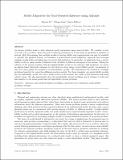| dc.contributor.author | Li, Harriet | |
| dc.contributor.author | Garg, Vikram V. | |
| dc.contributor.author | Willcox, Karen E | |
| dc.date.accessioned | 2020-03-03T20:13:50Z | |
| dc.date.available | 2020-03-03T20:13:50Z | |
| dc.date.issued | 2017-11 | |
| dc.date.submitted | 2017-10 | |
| dc.identifier.issn | 0045-7825 | |
| dc.identifier.uri | https://hdl.handle.net/1721.1/123995 | |
| dc.description.abstract | An inverse problem seeks to infer unknown model parameters using observed data. We consider a goal-oriented inverse problem, where the goal of inferring parameters is to use them in predicting a quantity of interest (QoI). Recognizing that multiple models of varying fidelity and computational cost may be available to describe the physical system, we formulate a goal-oriented model adaptivity approach that leverages multiple models while controlling the error in the QoI prediction. In particular, we adaptively form a mixed-fidelity model by using models of different levels of fidelity in different subregions of the domain. Taking the solution of the inverse problem with the highest-fidelity model as our reference QoI prediction, we derive an adjoint-based third-order estimate for the QoI error from using a lower-fidelity model. Localization of this error then guides the formation of mixed-fidelity models. We demonstrate the method for example problems described by convection–diffusion–reaction models. For these examples, our mixed-fidelity models use the high-fidelity model over only a small portion of the domain, but result in QoI estimates with small relative errors. We also demonstrate that the mixed-fidelity inverse problems can be cheaper to solve and less sensitive to the initial guess than the high-fidelity inverse problems. Keyword: Inference; Goal-oriented adaptive modeling; A posteriori error estimation; Multi-fidelity modeling; Adjoints | en_US |
| dc.description.sponsorship | United States. Department of Energy ( DE-FC02-13ER26129/DE-21 SC000929) | en_US |
| dc.language.iso | en_US | |
| dc.publisher | Elsevier BV | en_US |
| dc.relation.isversionof | https://doi.org/10.1016/j.cma.2017.11.018 | en_US |
| dc.rights | Creative Commons Attribution-NonCommercial-NoDerivs License | en_US |
| dc.rights.uri | http://creativecommons.org/licenses/by-nc-nd/4.0/ | en_US |
| dc.source | Prof. Willcox via Barbara Williams | en_US |
| dc.title | Model Adaptivity for Goal-Oriented Inference using Adjoints | en_US |
| dc.title.alternative | Model adaptivity for goal-oriented inference using adjoints | en_US |
| dc.type | Article | en_US |
| dc.identifier.citation | Li, Harriet, Vikram V. Garg, and Karen Willcox. "Model adaptivity for goal-oriented inference using adjoints." Computer Methods in Applied Mechanics and Engineering, 331 (April 2018): 1-22. | en_US |
| dc.contributor.department | Massachusetts Institute of Technology. Department of Aeronautics and Astronautics | en_US |
| dc.contributor.approver | Willcox, Karen E | en_US |
| dc.relation.journal | Computer Methods in Applied Mechanics and Engineering | en_US |
| dc.eprint.version | Author's final manuscript | en_US |
| dc.type.uri | http://purl.org/eprint/type/JournalArticle | en_US |
| eprint.status | http://purl.org/eprint/status/PeerReviewed | en_US |
| dspace.embargo.terms | N | en_US |
| dspace.date.submission | 2019-04-04T13:45:34Z | |
| mit.journal.volume | 331 | en_US |
| mit.license | PUBLISHER_CC | en_US |
| mit.license | OPEN_ACCESS_POLICY | |
| mit.metadata.status | Complete | |
